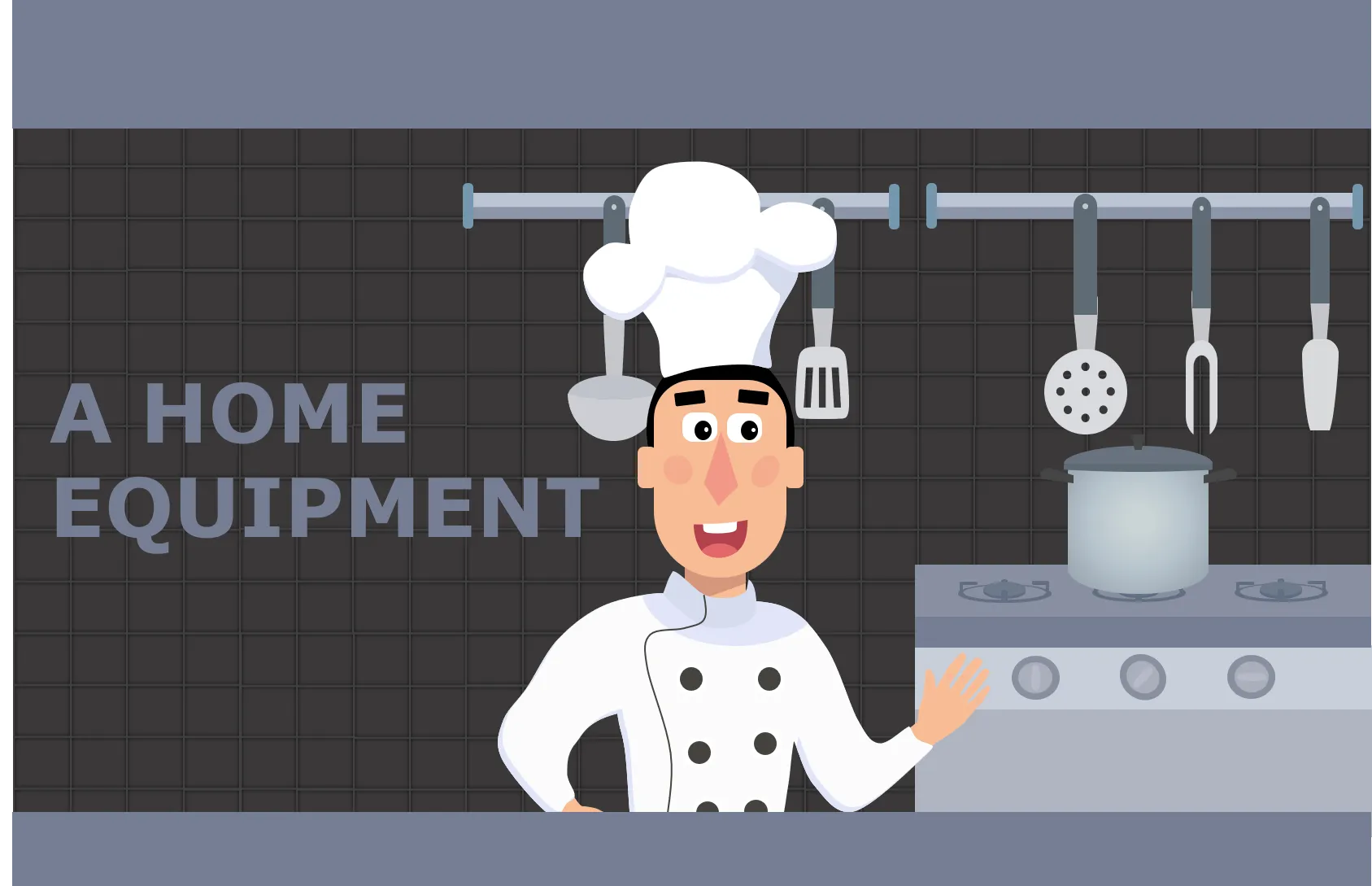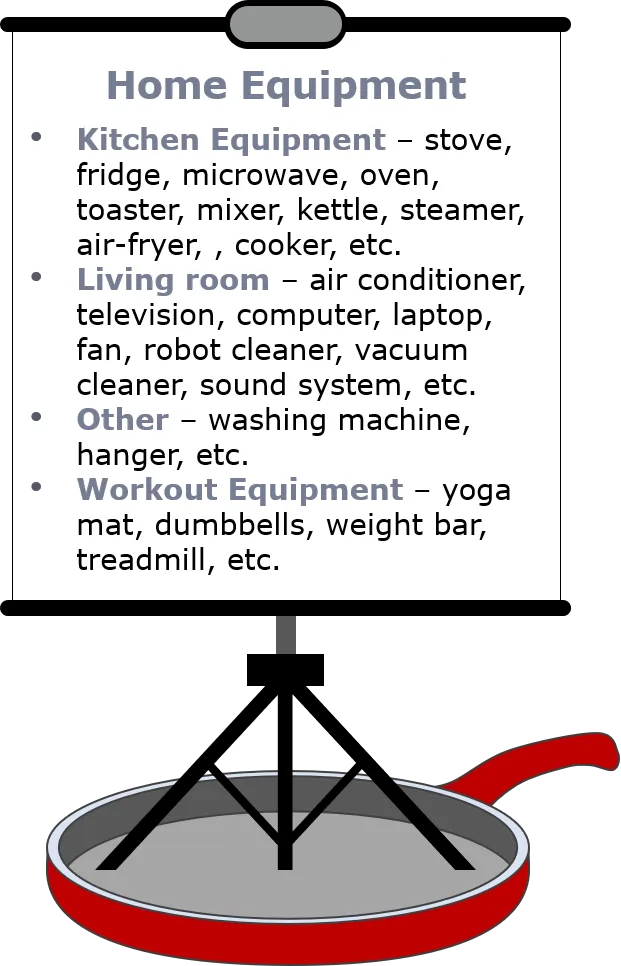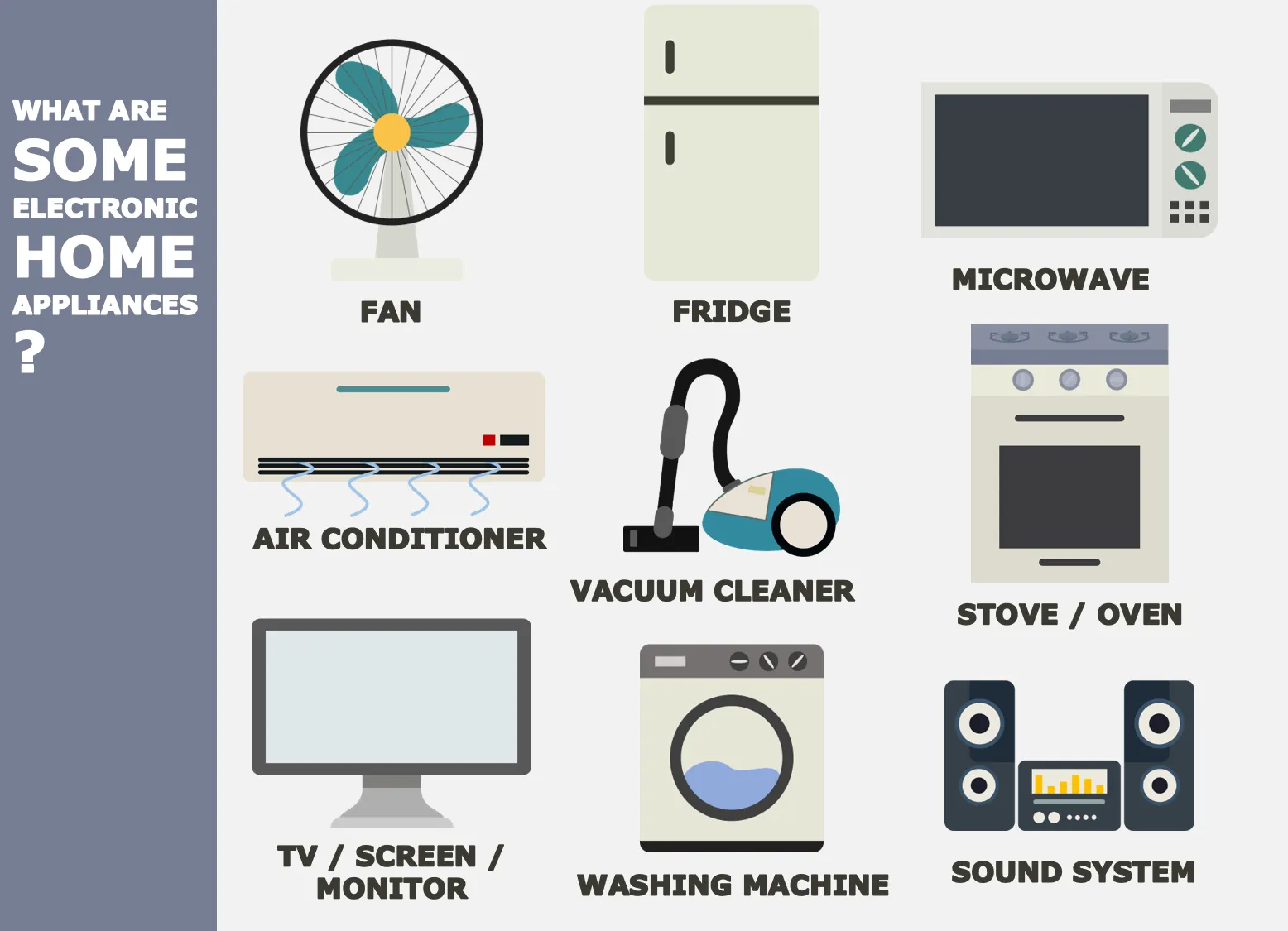Things to consider:
- It is definitely better if you talk about some interesting household machine. Of course, if you don't own any special equipment at home, you don't have to describe that, or you can make up that you have it.
- The key vocabulary here are different types of equipment, try to learn at least 10 different machines and use their names all around Part 3.
- It will be challenging to talk too long about one single machine, and so you can start talking about many machines you have at home and then move on to the most important one.
- Try to think about at least 3 different ways you use that piece of technology.
Part 2: Sample Answer
Ok, so about equipment… I’d say that I'm trying to live a more frugal life than most. This means that I don’t buy any unnecessary equipment, home decoration or luxury items. Personally, I prefer to save the money and use them on something more meaningful like eating a gorgeous meal or traveling more often. This means that I don’t have many items you could call important, and therefore… let me see… I’ll tell you about the second monitor to my gaming laptop I have at home.
In this intro, I give my opinion about buying many items.
Straight up, I’ll tell you, having a second monitor for your laptop is a game-changer. This was something I couldn’t really experience in the past, but once I bought my second screen, I was able to do so much more. I use it every day, as I have a laptop wired directly to it. I never move those from home, and instead, I use a cheaper work laptop just for business. Anyway, back to the screen.
I introduce the item of my topic - a second monitor.
Having a second monitor allows me many, and I mean many conveniences. For instance, I can play videos on the main laptop screen, like things from YouTube, and work or play video games on the second bigger screen. Moreover, I can use both screens to open up more browsers if I’m researching something or designing something. I can use one of the desktops for my work, teaching online, and the second one for a PPT that I can share with my students. I’d say, having a second screen adds so much to my life, I can’t see myself without one.
I give a few examples on how I use it.
As I just mentioned, this piece of equipment has become an invaluable part of my life. I’d highly recommend anyone to try this type of setup. You don’t need to buy an expensive one. A cheap, bigger monitor could do wonders and can make your life more efficient. It’ll bring more order and comfort for doing anything related to gaming, design, research and just entertainment in general. So, yeah, I’m a big fan of this 2 screen setup.
Explaining my feelings about this item.
Sentence starters and Linking words
Vocabulary related to the topic
Examiner: What kinds of machines are there in people’s homes?
Daily Use Machines
- Most families these days need to have some common machines for daily use. Every family has a washing machine, a vacuum cleaner, a TV, a computer or a laptop, an air conditioner, and some kitchen machines like a stove, a microwave and so on. These are common and you can mention all of them if you can in this answer.
Hot Gadgets
- People who can afford them, love buying the latest and hottest electronic toys and gadgets. Some of these electronic gadgets are for entertainment - a VR set with glasses, a projector or a home cinema system, a loud sound system, and one, two or even three extra screens for gaming and movies. Other machines can be some kitchen tools like a kitchen robot, a juicer, a coffee machine and so on. And don't forget the little Roomba sweeper.
ANSWER:
Most people will own the general household appliances depending on the rooms they are in. For some kitchen equipment there is the fridge, a gas or electric stove, an oven, a cooker or a rice cooker, a kettle for hot water, and maybe some of the more modern tools like an air-fryer, a juicer or a waffle machine. Moving on to the living room and all other rooms in general, there is usually an air conditioner in most of the rooms, some fans for the hottest days, a TV and maybe a sound system. Further, for the most modern and especially for gamers, there would be many high-tech gadgets like a gaming PC, laptops, a PlayStation or an X-box and so on. There are a lot of things one person can own if he can afford it.
Examiner: What are the differences between the young and the old in their attitudes towards machines?
For the Old
- Old people are more rigid and don't like to deal with too many machines. Of course, there are exceptions to this rule, but in general the older we get, the slower we understand new technology and we try to avoid it. This does not mean that we completely ignore it though. For instance, I've seen many older people above 60 watching live shows or videos online on YouTube or other streaming platforms.
For the Young
- Young people jump enthusiastically on to every new type of technology. For the young there is a sense of FOMO (fear of missing out) and because of this phenomenon, they hurry to try the latest entertainment gadget, kitchen tool or household equipment. We're talking about VR, home robots, Nintendo Switch (Pro?) and many many more.
ANSWER:
Examiner: What kinds of professions require people to use machines?
Office Jobs
- Almost every office job these days requires people to use machines and technology in one way or another. Office workers may have to use printers and scanners to work with documents. They always need to use computers to create files and work with software. They may need to have presentations and use projectors in front of their colleagues.
The Service Industry
- We live in a time when basic jobs are being replaced by machines all around us. All the fast food chains are replacing their cashiers with self-service terminals. All the banks have already replaced every low level employee with a machine or with an online service. Supermarkets are becoming cashier-less. So machines are everywhere around us... very soon we might even use self-driving taxis and busses.
ANSWER:
Well, these days almost every profession has to deal with some type of machine. I mean… even a McDonalds employee has to work with self-service terminals, and all the machines in the kitchen. Office workers have to work on computers and use printers every day. Construction workers have to work with different building machines. Hairdressers have to use different types of haircut machines to give the best service possible. The list goes on and on. Many professions have to rely on machines, and our life is being completely changed in a positive and perhaps in a sometimes negative way. Like it or not, we all have to rely on and use machines these days.
Examiner: Will many people’s work be done by robots in the future?
Near Future
- In the near future, robots will be used to replace the heaviest and most dangerous jobs that people do. Factories will completely automate. Soldiers and aircrafts will become drones and self-piloting planes. Building and construction will further automate. However, we will still keep many jobs related to service, entertainment and even education.
Far Distant Future
- This is up to your imagination. If you ask me, I believe robots will become similar to humans. They will walk among us and help us do many different tasks in our daily life. Perhaps, every family will have an assistant robot who will clean, carry heavy things in and out, throw out the trash and even help you scrub your back in the shower. Peaceful and helpful co-existence with machines.
ANSWER:
This depends. If we’re talking about the near future, the next 50 to 100 years, I believe robots will take up only the heaviest and most dangerous jobs out of people’s hands. Yes, all the factories producing something will completely switch to using machines and robots. However, many service jobs will still be done by people, as number one we have huge populations to feed and second they will bring a personal touch, something a machine can’t provide, at least for the time being. Now, if we’re talking about the far distant future, we can only speculate about it. Personally, I believe that we’ll reach some type of development, where robots will walk among us and serve us in many ways, but again I doubt they’ll take all the jobs. Robots will just be our assistants.




